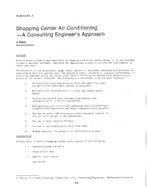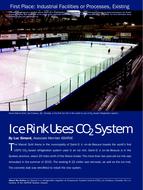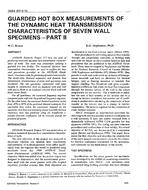The freezing and melting characteristics peculiar to encapsulated ice are analysed and the important features, such as the variable rates of heat transfer during the phase-change process, identified. An ice store model is developed considering the fluid flow through the store and the separate freezing and melting within the capsule, at macro and micro levels, linking them by the heat transfer across the capsule skin. A component-based program is selected to model a complete ice-storage system including the ice store, chiller, and other equipment and controls. The ice store component uses measured values of heat transfer for the capsules but has the facility to incorporate a numerical model of the capsule contents. Examples of graphical output demonstrate that the model realistically simulates the anticipated characteristics of an ice store. It is concluded that system simulation of seasonal performance is practical on a personal computer. A second part of this paper will include model validation using a test rig and the results of measured values of heat transfer between the capsule and the chilling fluid.
KEYWORDS: calculating, energy storage, ice storage, cold sources, freezing, melting, heat flow, fluid flow, chillers, microcomputers.
Citation: Symposium Papers, Atlanta, GA, 1990
Product Details
- Published:
- 1990
- Number of Pages:
- 8
- File Size:
- 1 file , 1000 KB
- Product Code(s):
- D-18502


